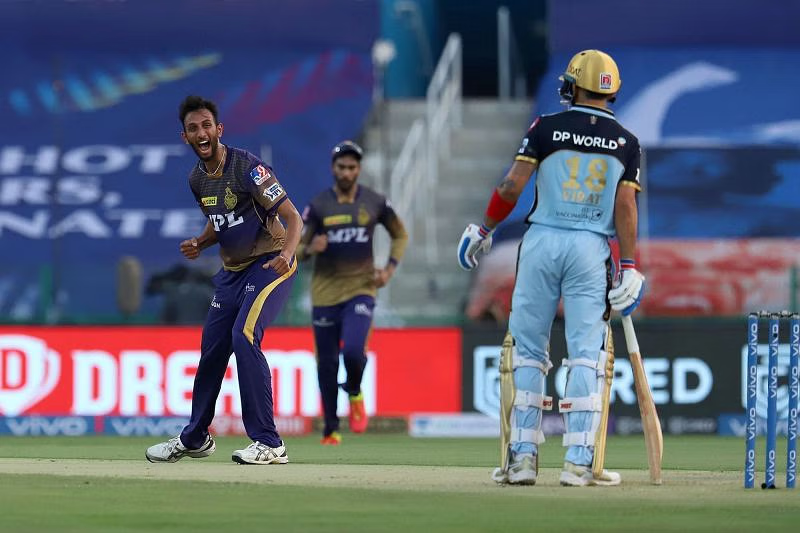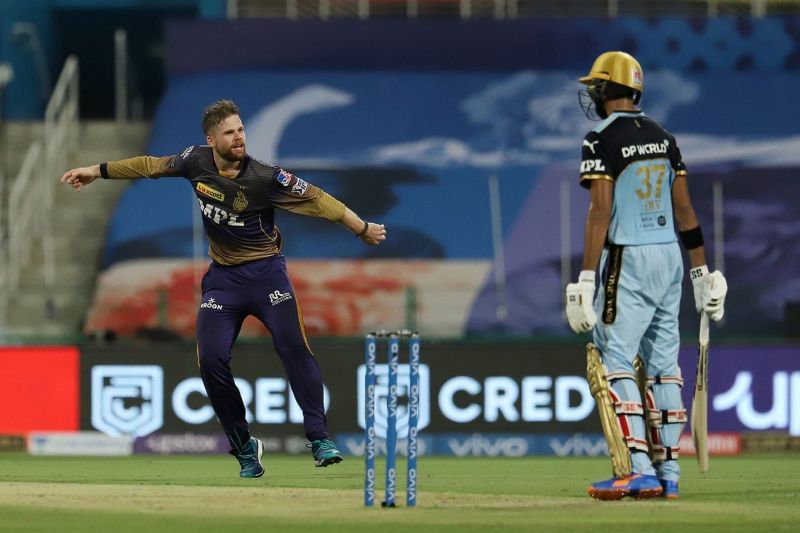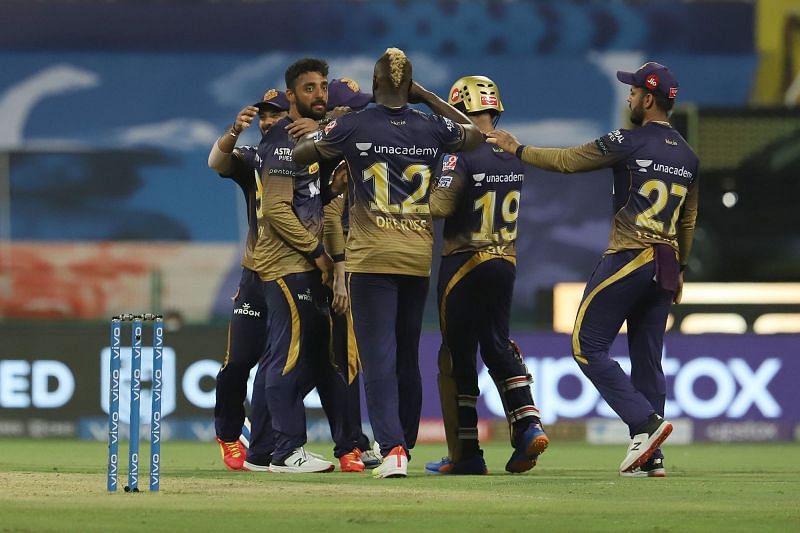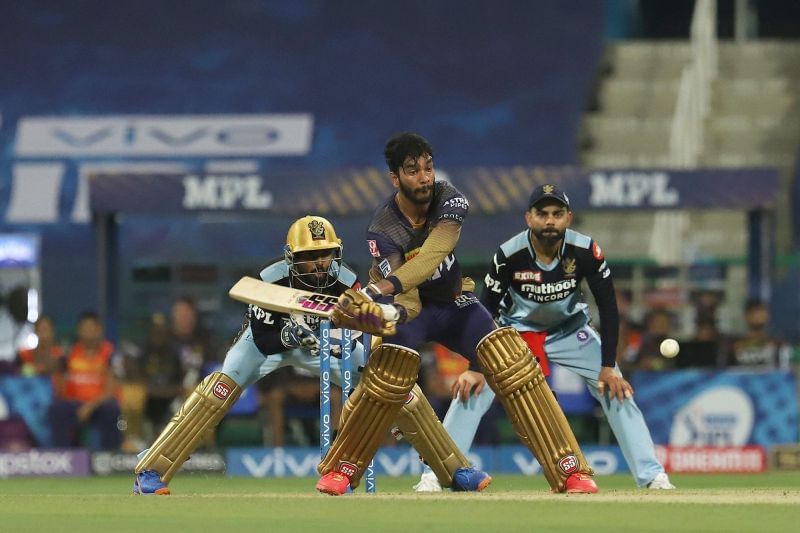
How KKR turned back the clock on RCB's day of blues

The Royal Challengers Bangalore (RCB) turned up in blue to face the Kolkata Knight Riders (KKR) for their eighth match of the 2021 Indian Premier League (IPL) season. Touted as a one-off, with money from the auctioned jerseys set to go towards the welfare of COVID-19 frontline workers, RCB expected a solid display to go with the cause.
Although the team was forced to undergo several changes due to player withdrawals and injury, their opposition was not the sort to trouble the think tank, at least on paper. Languishing at 7th on the points table, and punching bags in their last four encounters together, KKR barely looked the part before the game.
But as KKR showed on Monday, the Kolkata-based franchise hasn't always been a side to take for granted. Two of RCB's most demoralizing losses in the 2017 season - the 49-all-out game as well as the game where Chris Lynn and Sunil Narine crossed 100 within the powerplay - were against KKR.
On Monday, Eoin Morgan's men brought the blues back for RCB. How did they do it, though?
Smart bowling changes, and wickets up front

Gautam Gambhir's storied reign as KKR captain was littered with instances of smart tactical gambits that paid off. A feature of his captaincy was the proactive management of bowlers inside the powerplay, never giving the opposition a chance to adjust and setting up favorable match-ups.
With all due respect to Pat Cummins as an all-round asset for KKR, he has let the team down as a pace-bowling spearhead in the past two years. His forced absence from this game meant Morgan could use the attacking Lockie Ferguson as an enforcer in the powerplay to supplement KKR's dangerous mystery spinners and the confident Prasidh Krishna. Coupled with smart field placings which choked up the singles, KKR delivered a superb powerplay with ball in hand.
Morgan's move ensured Prasidh got to use the seam movement on offer against a tentative Kohli, yielding the RCB skipper's prized scalp early. Unlike the KKR of the past two seasons, who kept Ferguson as a middle-overs strike bowler, bowling the Kiwi twice inside the powerplay ensured the runs were controlled. The pressure mounted on Devdutt Padikkal as well, leading to his wicket.
KKR's long-term placement of trust in Shivam Mavi and Kamlesh Nagarkoti has only caused the franchise disappointment, with the duo struggling to make an impression or intimidate the opposition. On Monday, KKR's attack read: Ferguson, Prasidh, Narine, Chakaravarthy, Russell. Five in-form, highly skilful bowlers, all of whom executed the plans laid out for them.
KKR's tweakers spinning a web in the middle overs

Prior to 2017, when the Eden Gardens surface changed to become more pacer-friendly, KKR's home ground was one of the best for spinners in the IPL. Spinners got the benefit of a slightly dry pitch and big boundaries, thus making the Eden Gardens a fortress during KKR's best years.
The only spinner to remain from that era, Sunil Narine, had a role to play here as well. One of the key match-ups of the night was that of Glenn Maxwell, arguably RCB's best player of spin, against Narine. The Trinidadian handsomely prevailed, beating Maxwell's hoicks and attempted switch-hits with his subtle variations. Although he went wicketless, he conceded a paltry 20 runs from four overs against an RCB batting unit composed of some modern greats.
At the other end, fresh off T20 World Cup selection, Varun Chakaravarthy had a point to prove of his own. Selected ahead of opposite number Yuzvendra Chahal, the mystery spinner comfortably out-bowled his counterpart with a phenomenal spell of 3-13, including the big wicket of Maxwell. In 10 overs after the powerplay, RCB added just 38 runs for the loss of six wickets.
The spinners' chokehold over proceedings meant the faster men cashed in too, leading to Andre Russell picking up a three-for of his own. To their credit, they were extremely accurate for the most part, and never let up on the pressure created by the spinners. Russell's yorker to account for De Villiers was a key moment which ensured there was no major change in the script after the early wickets.
Fearless batting from the openers, at last

KKR revolutionized IPL batting to some extent by opening the innings with Chris Lynn and Sunil Narine in 2017 - two openers who threw the kitchen sink at the ball, easing up the job for the Indian batting core to follow. In the past two years, they have moved away from that configuration, ending up with Shubman Gill and Nitish Rana who have become notorious for slow starts in the early part of the innings.
Much to the delight of the aggressive captain Morgan and coach Brendon McCullum, KKR's new opening pair - Gill and debutant Venkatesh Iyer - came out with the intent to give their team a big net run rate boost. The duo played fearlessly - helped in large part by a paltry target of 93 - to eliminate all scope for an RCB comeback in the game.
Both openers had a lot to prove. Gill has been under fire for his slow starts, and although he looks set to star for India going forward, his ability to move through the gears in the shortest format was coming under the scanner. As for Iyer, it could barely have been a more high-stakes debut, with KKR one loss away from having to win every single game. Both stunned RCB in a strong indication of KKR's ambition for the rest of the season.